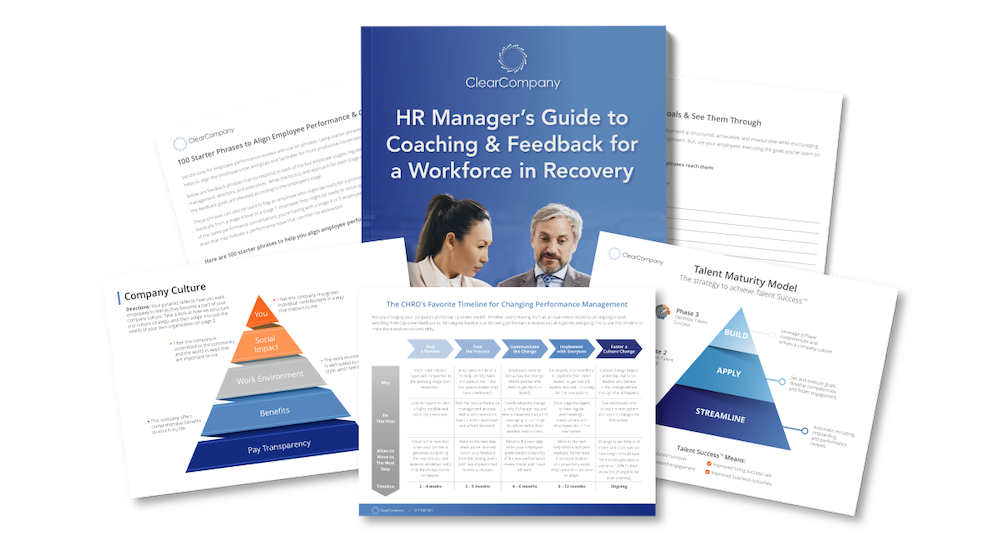Human resources professionals are there for all of the ups and downs of people management. We get to make job offers and help employees understand benefits, but we are also responsible for giving bad news and enforcing changes at work. Working in HR is a rewarding and gratifying career, but it’s not without challenges.
Despite the challenges, most in HR find their job to be rewarding. According to SHRM, an incredible 95% of HR employees surveyed had high “meaningful work” scores, which means they responded positively to questions about their happiness at work.
Despite its challenges, 95% of HR practitioners find their work meaningful. Become a great #HRleader by understanding HR strengths and weaknesses:To be a successful practitioner, you should be aware of some common HR strengths and weaknesses. Learn some of the actions that make great HR leaders and common weaknesses that can hinder success.
HR Strengths for Successful Leaders
HR Strength #1: Prioritize Learning and Development
Great HR leaders value learning and development — both for themselves and for the employees they manage. Those that want to grow in the industry look for organizations that offer HR-specific leadership development programs. They join professional associations, attend conferences, take classes, and maintain their certifications. They also keep up with HR news, including changing requirements and trends.
Strong HR departments spearhead learning strategies that encourage employee growth, like mentoring and coaching. Your team can advocate for organizational mentorship and coaching programs that help employees excel and increase engagement.
HR Strength #2: Advocate for Employees
HR was built to bridge the gap between the employer and employee. When a worker has an issue with coworkers, leadership, or employment terms, they are directed to HR. The same is true for executives. When a decision is made, it is HR who will navigate the communication and anticipate the backlash.
A great HR leader understands that advocating for employees, whether in the form of more autonomy, sick leave, or other benefits, is an investment in both the employees and the company. This may be your HR team’s greatest strength if your strategies include getting employee feedback on benefits and policies and listening to their suggestions and concerns.
HR Strength #3: Understand Compliance
HR professionals specialize in everything from compensation and benefits to employment law because employment is filled with rules and nuances. The HR team is the knowledgeable resource executives trust to keep company hiring and management processes compliant and secure.
Employers lean on HR to ensure the organization is meeting regulations and remaining current on local and national expectations. Legislation regarding work and employees is constantly changing at both federal and state levels. Great HR managers stay on top of these changes and ensure their workplace, and their people are compliant.
HR has tons of strengths, but a few vulnerabilities, too — find out what they are in @ClearCompany’s latest post:Common Weaknesses of HR Professionals
HR Weakness #1: Ignore the “Finance Part”
Only 25% of HR departments would say they have a “collaborative” relationship with their finance team. While finance and HR don’t seem to have much in common, they’re actually closely related. Both teams manage important business assets and maintain balance — whether across business finances or its workforce.
For HR, it is important to understand how financial data and analytics should influence hiring and management decisions. Yes, you have to spend money to produce productive employees, but the efficiency of funds is key for both the business’s bottom line and the satisfaction of workers.
“COVID has certainly highlighted the importance of the role of human resources in a business. What HR has had to navigate through has been nothing short of the biggest challenge the profession has faced in history, to the phenomenal opportunity it provided to shine a light on the impact of the role of HR leader.” - HRD
HR Weakness #2: No Strategic Foundation
Human resources are absolutely a strategic function, and the future of work trends point to its increasing importance. That’s why it’s important that your HR strategies have a solid foundation.
To be effective and get support from other departments, HR strategies must be:
- Aligned with company objectives
- Supported by people management data
HR data and analytics can help make the connection between data and goals. Aligning strategy with goals is not only useful for furthering those goals but also shows the rest of the company exactly how HR plays a role. Data informs better strategy within HR but also speaks a more common language throughout departments, especially operations.
Data and goal alignment is especially important as HR leaders are in charge of change management, whether it’s rolling out a new health plan or adding a policy to the employee handbook. With a data-backed strategy, HR leaders can explain more about the why of a new policy, procedure, or plan and get everyone on board.
Easing that disconnect and simplifying data collection is exactly what propelled the creation of ClearCompany’s Talent Management solution. Our platform eases the administrative burden and each module from Applicant Tracking to Onboarding to Performance and Engagement also increases transparency. Every HR solution is powered by a core Talent Management System that uses the company mission, competencies, and goals to engage employees at every level.
HR Weakness #3: Less Customer-Focused
HR professionals have two main audiences to please, the employer and the employees. Due to their internal focus, there’s often a disconnect between HR and the customer. But we have to maintain that connection and consider the impact of HR strategy on our customers to be great HR leaders.
For example, HR KPIs often revolve around hiring and managing metrics like time to hire, retention, and productivity. To stay connected to customer needs when developing HR strategies, consider the impact of these metrics on the client:
- Faster time-to-hire ensures organizations are fully staffed and can support customers’ needs.
- High retention means that customers interact with employees who have a great depth of knowledge and high levels of satisfaction and engagement.
- Productive employees generally mean more satisfied customers. However, HR should monitor this alongside customer satisfaction metrics to ensure that increased productivity doesn’t result in neglecting their needs.
Tips for Growing HR Strengths
1. Stay current with HR trends.
Stay current with the latest trends in human resources to keep your skills sharp. Embrace continuous learning by taking professional development courses, reading industry publications regularly, attending HR conferences, and participating in webinars. Being proactive with your HR education and staying informed about what’s happening in the industry helps you develop relevant, effective strategies.
2. Ask for feedback.
Feedback is a powerful tool for growth. Ask for input from employees, peers, and managers to identify areas for improvement in HR processes. Send regular employee surveys and host weekly one-on-one meetings and open forums for discussion to foster a culture of continuous improvement.
3. Use HR technology.
Leveraging HR technology is an excellent way to optimize and streamline processes. Tools like applicant tracking systems (ATS), performance management software, and, most of all, unified talent management systems reduce the administrative burden on your team and provide valuable data insights. By integrating technology into your HR practices, you can focus more on strategic initiatives that drive team and organizational success.
4. Align HR strategies with business goals.
The key to a highly effective HR function? HR strategies that align with your business’s goals.
When your team understands the company’s mission, vision, and goals, you’re better equipped to develop strategies that have an impact. Whether it's through talent management, employee development, or culture building, aligning HR efforts with organizational goals ensures that every action taken by your team supports the company’s long-term vision.
Use these common HR strengths and weaknesses to find what your team is great at and where they may be vulnerable. Great HR leaders are not born; they're made from years of practice, training, and dedication. Whether you are an HR professional or an organizational executive, grasping the strengths and weaknesses of HR can help you understand some of the challenges your company will need to overcome together.
Develop HR strengths and bolster weak spots with ClearCompany’s comprehensive Talent Management System, built with HR best practices in mind. Sign up for your personalized demo of our award-winning platform today.



